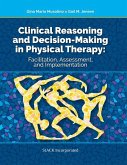Matthews Model of Clinical Reasoning
A Systematic Guide to Occupation-Based Evaluation and Intervention Planning
Herausgeber: Knis-Matthews, Laurie
Matthews Model of Clinical Reasoning
A Systematic Guide to Occupation-Based Evaluation and Intervention Planning
Herausgeber: Knis-Matthews, Laurie
- Gebundenes Buch
- Merkliste
- Auf die Merkliste
- Bewerten Bewerten
- Teilen
- Produkt teilen
- Produkterinnerung
- Produkterinnerung
The Matthews Model of Clinical Reasoning (MMCR) provides occupational therapy practitioners with a systematic approach to develop their clinical reasoning skills during the evaluation and intervention process when collaborating with persons served across multiple practice locations.
Andere Kunden interessierten sich auch für
![A Computational Model of Reasoning from the Clinical Literature A Computational Model of Reasoning from the Clinical Literature]() Glenn D. RennelsA Computational Model of Reasoning from the Clinical Literature77,99 €
Glenn D. RennelsA Computational Model of Reasoning from the Clinical Literature77,99 €![Clinical Reasoning and Decision Making in Physical Therapy Clinical Reasoning and Decision Making in Physical Therapy]() Gina MusolinoClinical Reasoning and Decision Making in Physical Therapy93,99 €
Gina MusolinoClinical Reasoning and Decision Making in Physical Therapy93,99 €![Global Perspectives in Professional Reasoning Global Perspectives in Professional Reasoning]() Marilyn B. ColeGlobal Perspectives in Professional Reasoning75,99 €
Marilyn B. ColeGlobal Perspectives in Professional Reasoning75,99 €![The Psychology of Reasoning The Psychology of Reasoning]() Eugenio RignanoThe Psychology of Reasoning45,99 €
Eugenio RignanoThe Psychology of Reasoning45,99 €![Clinical Reasoning in the Health Professions Clinical Reasoning in the Health Professions]() Clinical Reasoning in the Health Professions54,99 €
Clinical Reasoning in the Health Professions54,99 €![CLINICAL REASONING FOR MEDICAL STUDENTS CLINICAL REASONING FOR MEDICAL STUDENTS]() Ranasinghe LasithCLINICAL REASONING FOR MEDICAL STUDENTS102,99 €
Ranasinghe LasithCLINICAL REASONING FOR MEDICAL STUDENTS102,99 €![Clinical Reasoning in the Health Professions Clinical Reasoning in the Health Professions]() Joy HiggsClinical Reasoning in the Health Professions41,99 €
Joy HiggsClinical Reasoning in the Health Professions41,99 €-
-
-
The Matthews Model of Clinical Reasoning (MMCR) provides occupational therapy practitioners with a systematic approach to develop their clinical reasoning skills during the evaluation and intervention process when collaborating with persons served across multiple practice locations.
Produktdetails
- Produktdetails
- Verlag: Routledge
- Seitenzahl: 304
- Erscheinungstermin: 24. November 2023
- Englisch
- Abmessung: 260mm x 183mm x 21mm
- Gewicht: 770g
- ISBN-13: 9781032491615
- ISBN-10: 1032491612
- Artikelnr.: 69114345
- Herstellerkennzeichnung
- Libri GmbH
- Europaallee 1
- 36244 Bad Hersfeld
- gpsr@libri.de
- Verlag: Routledge
- Seitenzahl: 304
- Erscheinungstermin: 24. November 2023
- Englisch
- Abmessung: 260mm x 183mm x 21mm
- Gewicht: 770g
- ISBN-13: 9781032491615
- ISBN-10: 1032491612
- Artikelnr.: 69114345
- Herstellerkennzeichnung
- Libri GmbH
- Europaallee 1
- 36244 Bad Hersfeld
- gpsr@libri.de
Laurie Knis-Matthews, PhD, OT, has been an occupational therapist for over thirty years, primarily focused on mental health practice. Laurie has been conceptualizing the MMCR since she began teaching full-time in academia over twenty-five years ago.
SECTION 1 Clinical Reasoning and Evaluation; 1 Exploring the Literature
Related to Clinical Reasoning; 2 The MMCR Approach to Evaluation Guided by
the Profession's Domain of Concern; 3 Compartmentalizing Evaluation
Information and Understanding the Person Served; 4 Compartmentalizing
Evaluation Information and Understanding the Six Facets of the Environment;
5 Compartmentalizing Evaluation Information to Understand How Activities
and Occupations Relate to a Person's Story; 6 Putting It All Together to
Identify Occupational Performance Issue(s); SECTION 2 Intervention; 7 MMCR
Five-Step Guide to Infusing the Frame of Reference/Practice Model Into a
Person's Story; 8 Overview to Intervention Planning: Spiraling Within the
Top-Middle- Bottom Occupational Performance Issues; 9 Overview to
Intervention Planning: Spiraling the Top-Middle-Bottom Occupational
Performance Issues Across the Intervention Plan; 10 Overview to
Intervention Planning: Spiraling the Top-Middle-Bottom Occupational
Performance Issues Across the Intervention Plan Continued; 11 Strategizing
the Beginning-Middle-Ending of the Specific Intervention Plan; 12
Strategizing How to Create Change During the Intervention Plan; SECTION 3
Documentation; 13 Documentation Overview and the Evaluation Summary; 14
Documentation Continued: Goal Creation, Progress Notes, and Discharge
Summaries; SECTION 4 Case Examples; 15 Case Example: Using the MMCR in an
Outpatient Hand Therapy Clinic Over 8 Weeks of Intervention; 16 Case
Example: Using the MMCR to Guide a Seven-Day Intervention Plan in an
Inpatient Acute Rehab Hospital; 17 Case Example: Using the MMCR to Guide a
Six-Month Intervention Plan for an Adult With an Intellectual and
Developmental Disability; 18 Case Example: Using the MMCR to Guide a
Three-Month Intervention Plan in a Homecare Setting
Related to Clinical Reasoning; 2 The MMCR Approach to Evaluation Guided by
the Profession's Domain of Concern; 3 Compartmentalizing Evaluation
Information and Understanding the Person Served; 4 Compartmentalizing
Evaluation Information and Understanding the Six Facets of the Environment;
5 Compartmentalizing Evaluation Information to Understand How Activities
and Occupations Relate to a Person's Story; 6 Putting It All Together to
Identify Occupational Performance Issue(s); SECTION 2 Intervention; 7 MMCR
Five-Step Guide to Infusing the Frame of Reference/Practice Model Into a
Person's Story; 8 Overview to Intervention Planning: Spiraling Within the
Top-Middle- Bottom Occupational Performance Issues; 9 Overview to
Intervention Planning: Spiraling the Top-Middle-Bottom Occupational
Performance Issues Across the Intervention Plan; 10 Overview to
Intervention Planning: Spiraling the Top-Middle-Bottom Occupational
Performance Issues Across the Intervention Plan Continued; 11 Strategizing
the Beginning-Middle-Ending of the Specific Intervention Plan; 12
Strategizing How to Create Change During the Intervention Plan; SECTION 3
Documentation; 13 Documentation Overview and the Evaluation Summary; 14
Documentation Continued: Goal Creation, Progress Notes, and Discharge
Summaries; SECTION 4 Case Examples; 15 Case Example: Using the MMCR in an
Outpatient Hand Therapy Clinic Over 8 Weeks of Intervention; 16 Case
Example: Using the MMCR to Guide a Seven-Day Intervention Plan in an
Inpatient Acute Rehab Hospital; 17 Case Example: Using the MMCR to Guide a
Six-Month Intervention Plan for an Adult With an Intellectual and
Developmental Disability; 18 Case Example: Using the MMCR to Guide a
Three-Month Intervention Plan in a Homecare Setting
SECTION 1 Clinical Reasoning and Evaluation; 1 Exploring the Literature
Related to Clinical Reasoning; 2 The MMCR Approach to Evaluation Guided by
the Profession's Domain of Concern; 3 Compartmentalizing Evaluation
Information and Understanding the Person Served; 4 Compartmentalizing
Evaluation Information and Understanding the Six Facets of the Environment;
5 Compartmentalizing Evaluation Information to Understand How Activities
and Occupations Relate to a Person's Story; 6 Putting It All Together to
Identify Occupational Performance Issue(s); SECTION 2 Intervention; 7 MMCR
Five-Step Guide to Infusing the Frame of Reference/Practice Model Into a
Person's Story; 8 Overview to Intervention Planning: Spiraling Within the
Top-Middle- Bottom Occupational Performance Issues; 9 Overview to
Intervention Planning: Spiraling the Top-Middle-Bottom Occupational
Performance Issues Across the Intervention Plan; 10 Overview to
Intervention Planning: Spiraling the Top-Middle-Bottom Occupational
Performance Issues Across the Intervention Plan Continued; 11 Strategizing
the Beginning-Middle-Ending of the Specific Intervention Plan; 12
Strategizing How to Create Change During the Intervention Plan; SECTION 3
Documentation; 13 Documentation Overview and the Evaluation Summary; 14
Documentation Continued: Goal Creation, Progress Notes, and Discharge
Summaries; SECTION 4 Case Examples; 15 Case Example: Using the MMCR in an
Outpatient Hand Therapy Clinic Over 8 Weeks of Intervention; 16 Case
Example: Using the MMCR to Guide a Seven-Day Intervention Plan in an
Inpatient Acute Rehab Hospital; 17 Case Example: Using the MMCR to Guide a
Six-Month Intervention Plan for an Adult With an Intellectual and
Developmental Disability; 18 Case Example: Using the MMCR to Guide a
Three-Month Intervention Plan in a Homecare Setting
Related to Clinical Reasoning; 2 The MMCR Approach to Evaluation Guided by
the Profession's Domain of Concern; 3 Compartmentalizing Evaluation
Information and Understanding the Person Served; 4 Compartmentalizing
Evaluation Information and Understanding the Six Facets of the Environment;
5 Compartmentalizing Evaluation Information to Understand How Activities
and Occupations Relate to a Person's Story; 6 Putting It All Together to
Identify Occupational Performance Issue(s); SECTION 2 Intervention; 7 MMCR
Five-Step Guide to Infusing the Frame of Reference/Practice Model Into a
Person's Story; 8 Overview to Intervention Planning: Spiraling Within the
Top-Middle- Bottom Occupational Performance Issues; 9 Overview to
Intervention Planning: Spiraling the Top-Middle-Bottom Occupational
Performance Issues Across the Intervention Plan; 10 Overview to
Intervention Planning: Spiraling the Top-Middle-Bottom Occupational
Performance Issues Across the Intervention Plan Continued; 11 Strategizing
the Beginning-Middle-Ending of the Specific Intervention Plan; 12
Strategizing How to Create Change During the Intervention Plan; SECTION 3
Documentation; 13 Documentation Overview and the Evaluation Summary; 14
Documentation Continued: Goal Creation, Progress Notes, and Discharge
Summaries; SECTION 4 Case Examples; 15 Case Example: Using the MMCR in an
Outpatient Hand Therapy Clinic Over 8 Weeks of Intervention; 16 Case
Example: Using the MMCR to Guide a Seven-Day Intervention Plan in an
Inpatient Acute Rehab Hospital; 17 Case Example: Using the MMCR to Guide a
Six-Month Intervention Plan for an Adult With an Intellectual and
Developmental Disability; 18 Case Example: Using the MMCR to Guide a
Three-Month Intervention Plan in a Homecare Setting









